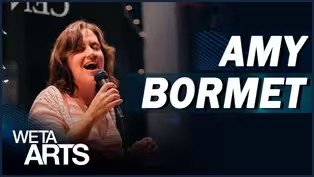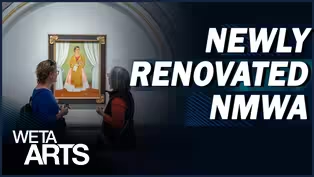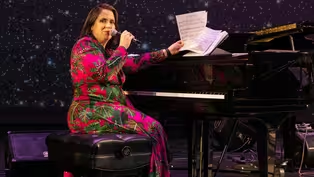
Explore Celtic Music with Musician Seán Heely
Clip: Season 11 Episode 6 | 8m 59sVideo has Closed Captions
WETA Arts delves into the celebration of Celtic culture with Seán Heely.
WETA Arts delves into the celebration of Celtic culture, particularly focusing on Scottish traditions as preserved by Seán Heely, a dedicated Celtic musician. Heely explains the differences between Irish folk music and Scottish folk music while emphasizing the importance of preserving traditional music and language.
Problems playing video? | Closed Captioning Feedback
Problems playing video? | Closed Captioning Feedback
WETA Arts is a local public television program presented by WETA

Explore Celtic Music with Musician Seán Heely
Clip: Season 11 Episode 6 | 8m 59sVideo has Closed Captions
WETA Arts delves into the celebration of Celtic culture, particularly focusing on Scottish traditions as preserved by Seán Heely, a dedicated Celtic musician. Heely explains the differences between Irish folk music and Scottish folk music while emphasizing the importance of preserving traditional music and language.
Problems playing video? | Closed Captioning Feedback
How to Watch WETA Arts
WETA Arts is available to stream on pbs.org and the free PBS App, available on iPhone, Apple TV, Android TV, Android smartphones, Amazon Fire TV, Amazon Fire Tablet, Roku, Samsung Smart TV, and Vizio.
Providing Support for PBS.org
Learn Moreabout PBS online sponsorshipSaint Patrick's Day celebrates the arrival of Christianity to Ireland.
The Irish are one of a number of peoples known as Celts who each have their own history, language, and music.
[Fiddle plays] Man: Welcome, everyone, to the MacMillan Whisky Room for the D.C. Scottish Session.
Curry, voice-over: Seán Heely is dedicated to preserving the Scottish Celtic tradition.
♪ We met him at a music gathering known as a session.
♪ Heely: My name is Seán Heely, and I am a professional Celtic musician-- Celtic fiddler, harpist, Gaelic singer.
♪ Celtic music draws me in because it's just a brilliant type of music while also drawing from a deep well of tradition.
Curry, voice-over: While Celtic culture shares similar roots, there are some key differences.
[People whooping] Heely: It's very much language- and location-based.
It's not just Ireland and Scotland.
We have Wales, Brittany in France, Galicia in Spain, Asturias, and many others.
If you just look simply at the comparison of Irish and Scottish music... ♪ with Irish, it's a bit more flowing and maybe more connected, and then when I'm playing Scottish fiddle music, there's a lot more lift off of the string.
♪ There's a bit more space, and there's a bit more directness, and then there's strathspeys.
♪ It's a type of dance tune, and everything about them is what you would think Scottish music is.
It's got this kind of direct nature to it.
♪ Da-dum day da-da-day da ♪ ♪ Dum ba-day da-da da da-da da-da dum ♪ It's got the Scotch snap, we call it.
Curry, voice-over: Heely got into music by way of his family.
He began his musical journey at 10 years old.
Heely: My elder sister actually had played the violin, and I started plucking on it and thought it was pretty cool.
I played Irish fiddle as well as classical.
I loved all the great pieces by Beethoven, Mozart, and Vivaldi.
I did a lot of time just obsessively practicing this harder-level music that I really had no business doing, but somehow I did it.
Ha ha!
I took it as far as senior year of college, and I was paying the bills by playing in symphonies.
I could have easily gone into that symphony route, but it just became sort of, like, my passion to go really deep into Scottish music and culture.
♪ One of the things that I noticed successful people in the field doing is competitions.
There was one here in the Warrenton, Virginia, area.
Then I said, "Well, I got to prepare some music for this competition and see what I can do."
♪ I was playing more of the music that I liked, and it wasn't necessarily what they were looking for.
They were looking for more of that East Coast Scottish music, so that more classical side, and I was like, "Well, I could do that"... ♪ so I prepared a whole different set and went back the next year and won.
♪ It's good street cred, but it's more about what you do after that really counts.
[Applause] Curry, voice-over: Since becoming a Scottish fiddle champion, Heely has toured nationally and internationally as a solo artist and in Celtic bands.
He's recorded albums, performs an annual Christmas show of Scottish and Irish music, and he was even an artist- in-residence at Strathmore, a premier music mentorship program.
Heely also teaches the next generation of Celtic musicians.
Heely: I have a private studio, and right now, I teach mostly adults, but I do teach kids, as well, and the first thing that I usually spend at least a year or more teaching is just how to bow different tunes-- bow a jig, bow a reel... ♪ and then ornaments with the left hand or the right hand, that's a whole language in itself... ♪ and then sometimes when I'm playing, you'll hear a little bit of double-stopping, we call it, so droning.
♪ Curry, voice-over: To better understand the music, Seán Heely also learned Gaelic, which allows him to study some Celtic music in its original language.
Heely: I consider myself a tradition bearer, and also I'm adding to the tradition with my own compositions.
I became that way after learning about the culture and learning what was fading, so, like, when I go to Scotland sometimes these days, like in Glasgow, I don't hear any of the old music, and it kind of bothers me, really.
For me, like, the real heart of the music is that original stuff that was happening, and I knew that in order to be able to build on that, I needed to know the foundations of what was written before.
[Click] [Woman singing in Gaelic] Heely: One time, I went to the Library of Congress and listened to some old recordings, and it was fascinating, like, to hear some of the Gaelic songs.
Woman: ♪ Gu'n tugadh crodh Chailein... ♪ Heely: There was a recording I like to mention.
I heard this kind of, like, "squeesh" and then this sound of liquid hitting something, and I looked up the notes, which are all in Gaelic, and was able to deduce that it was a milking song for a cow.
[Splash splash] Chorus: ♪ Ill o bha bo... ♪ Heely: There were songs for everything, and that was so fascinating to learn, and I was able to actually perform one of those songs from the archives.
♪ O theid is gun teid ♪ ♪ O theid mi thairis ♪ ♪ Gu innis nam bo ♪ ♪ Far an ceolmhor ainnir ♪ ♪ Ill o bha ho... ♪ Curry, voice-over: Heely channels his research and experience into the Scottish sessions he leads in hopes of keeping the traditions alive.
♪ Heely: The most brilliant thing about sessions is, it includes everyone.
Anybody could come and give a song.
Anybody can bring their instrument and play along to the music.
♪ Woman: In general, we probably have 10 or 15 people actually playing in the session, and then at least another 10 or 15 who have come specifically to watch us play.
♪ Woman: This music just feels like it's in my soul, and when it just all comes together, it's just when I feel most alive.
♪ Heely: I love being able to do so many different things with it.
I'm able to perform in almost any location with this music.
Whether a giant concert hall or a very intimate space like a pub, it just feels the same.
There's no ego about it.
Woman: Scottish sessions are always friendly.
Everybody is welcome.
You don't have to play music.
You just have to come.
♪ Man: The music played at the session is pure.
There's no amplification, no sound effects.
It just goes right from the musicians directly to your ears.
Once you're hooked, you're hooked.
Woman: This is something that I wish we had more of.
When I've traveled to Scotland, I experienced this at sessions there, and I just wish this was a weekly thing.
Fox: I think that's something about Celtic music in general, is, it's not just about the notes that you're playing.
It's about everything that surrounds it.
♪ Heely: It's all about sharing and community.
♪ Curry, voice-over: Drop in on Seán Heely at a D.C. Scottish session at the MacMillan Spirit House in Alexandria, Virginia.
For more performances, check out seanheely.com, and there's more Scottish music to enjoy at Tartan Day Tattoo D.C. on April 2nd at Northern Virginia Community College in Alexandria.
Go to thewashingtontattoo.com for tickets.
♪ Whoo!
Whoo!
[Whooping and applause]
Meet DC Jazz Musician Amy Bormet
Video has Closed Captions
Clip: S11 Ep6 | 8m 42s | WETA Arts profiles D.C. pianist Amy Bormet. (8m 42s)
The Newly-Renovated National Museum of Women in the Arts
Video has Closed Captions
Clip: S11 Ep6 | 7m 47s | Felicia Curry explores the renovation and grand reopening of the National Museum of Women (7m 47s)
Preview: S11 Ep6 | 30s | Nat’l Museum of Women in the Arts; fiddler Seán Heely; Jazz community leader Amy Bormet. (30s)
Providing Support for PBS.org
Learn Moreabout PBS online sponsorship
- Arts and Music
The Best of the Joy of Painting with Bob Ross
A pop icon, Bob Ross offers soothing words of wisdom as he paints captivating landscapes.













Support for PBS provided by:
WETA Arts is a local public television program presented by WETA



